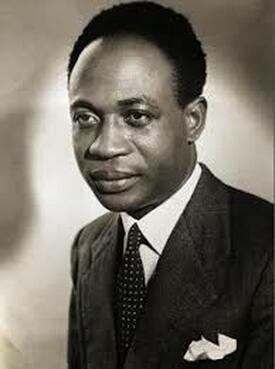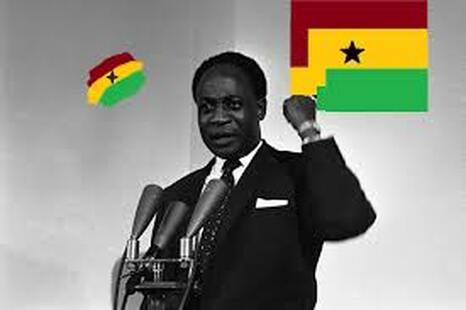|
Francis Nwia-Kofi Ngonloma was born on September 21, 1909, in Nkroful, Ghana, to parents Kofi Ngonloma and Elizabeth Nyanibah. As a young boy Nkrumah had a love for education, a passion that would help him excel in school. He received an early education attending mission schools in Accra, Ghana before completing his grade school education at the Prince of Wales’ Achimota School in Accra, Ghana. Nkrumah graduated from Achimota in 1930 and worked as a teacher until 1935, during this time he was introduced to ideas of Black Nationalism, liberation and anti-colonialism. 1935 was also the year that Nkrumah left Ghana for the United States to earn a college education. He would attend the historically black institution Lincoln University located in Oxford, Pennsylvania. Nkrumah earned his Bachelor of Arts in Economics in 1939 and his Bachelor of Theology in 1942 as a Lincoln University student. Following his time at Lincoln, he enrolled into the University of Pennsylvania where he earned a Masters of Philosophy and a Masters of Education by 1943. During Nkrumah’s time as a college student, he experienced the rise of black consciousness in America through Garveyism, Black Nationalism, Pan-Africanism and the African American response to the Jim Crow laws. Nkrumah was a co-founder of the African Students Association of America and Canada, helped to create of the West African Student’s Union, and played an important role in organizing the 5th Pan-Africanist Congress. As a believer in a united black Africa, Nkrumah often convened with various black thinkers, educators, leaders and idealist throughout the African diaspora, trading ideas and learning new information about liberation. In May of 1945, Nkrumah left the United States for London, England where he studied as a PhD. student at the London School of Economics; later in 1945, Francis Nwia-Kofi Ngonloma officially changed his name to Kwame Nkrumah. He did not complete his studies to earn his PhD. because he was embarking on a mission much greater. Even though he left his formal educational setting he never stopped learning, he became well versed in politics, organizing, leadership, nation building, etc. In 1947, Nkrumah returned to Ghana as an intellectual, political and tactical weapon his people could use to liberate themselves. Before his return to his homeland Nkrumah earned a reputation around the world as fierce force fighting for freedom, justice and equality for black people. Nkrumah was well equipped to contend with white supremacy. After returning to Ghana, he became the general secretary of the United Gold Coast Convention (UGCC), an organization that created strategies to help gain their independence from England. As a member of the UGCC Nkrumah directly challenged British rule and their oppressive laws against the people of Ghana; Nkrumah and the UGCC were awakening a fire of freedom in the people of Ghana. By 1949, Nkrumah and the UGCC parted ways due to differences in philosophies, he then created his own Convention People's Party (CPP). Under the banner of the CPP Nkrumah and the people were putting immense pressure on the British who ruled Ghana. The Nkrumah led CPP lobbied for self-government, universal franchise, a separate house of chiefs, and many more constitutional changes. Nkrumah’s ideas and organization was not welcomed by the British, he was imprisoned for his political activities and given a sentence of three years. During his incarceration the CPP continued to challenge British politics by protesting and also winning the 1951 political elections. With members of the CPP making political decisions, Nkrumah did not have to serve his full three year sentence. In 1952, the political landscape of Ghana changed when Nkrumah was elected as Prime Minister; his presence meant that the British could not influence the leaders of Ghana. A five year plan was created to rid the Gold Cost of British rule and to strengthen their mission by working together with their fellow African countries. In 1957, Ghana officially gained its independence from the British due to the efforts of the CPP and Kwame Nkrumah. Dr. Martin Luther King Jr befriended Nkrumah and the two shared philosophies during King’s visit to Ghana in 1957. Both men admired many aspects of the other and were able to grow as leaders within their respective countries. The New Republic of Africa was formed three years into Nkrumah’s tenure as Prime Minister of Ghana. With ideas of African unity rooted in Pan-Africanism and Black Nationalism, Nkrumah created alliances with as many of his neighboring countries as he could. In 1963, the Organization of African Unity was formed with the goal of creating a league of African states, a collective that would improve the conditions for as many African people as possible; later in 1963, Nkrumah was awarded the International Lenin Peace Prize by the Soviet Union for strengthening peace among their comrades. By 1966, what is described as economic and political instability was present within Ghana and the CPP led government. Nkrumah and the CPP were overthrown by a Joseph Ankrah led coup d’état in 1966, driving Nkrumah and his family into exile. Sekou Tuore offered Nkrumah refuge in Conakry, Guinea as a friend and as a means to continue their mission of African liberation and unity. Nkrumah died of cancer in 1972 in Bucharest, Romania as an African leader who has his imprint on history. Fueled by his basic human right to be free and receive equal treatment, Nkrumah and the CPP led Ghana to their independence from the British and helped inspire other African nations to seek their independence. He was not only an inspiration to people on the continent of Africa but he inspired African people around the world. Francis Nwia-Kofi Ngonloma aka Kwame Nkrumah, we proudly stand on your shoulders. J. A. Ward Click here to learn more about the On the Shoulders of Giants book series!!! References: https://www.blackpast.org/global-african-history/nkrumah-kwame-1909-1972/ http://www.blackhistoryheroes.com/2010/09/kwame-nkrumah.html https://www.sahistory.org.za/people/dr-kwame-nkrumah https://kinginstitute.stanford.edu/encyclopedia/nkrumah-kwame
0 Comments
Leave a Reply. |
Details
Categories
All
Click Here to join our mailing list
|
Contact Us: |
Connect With Us |
Site powered by PIT Web Design



 RSS Feed
RSS Feed



